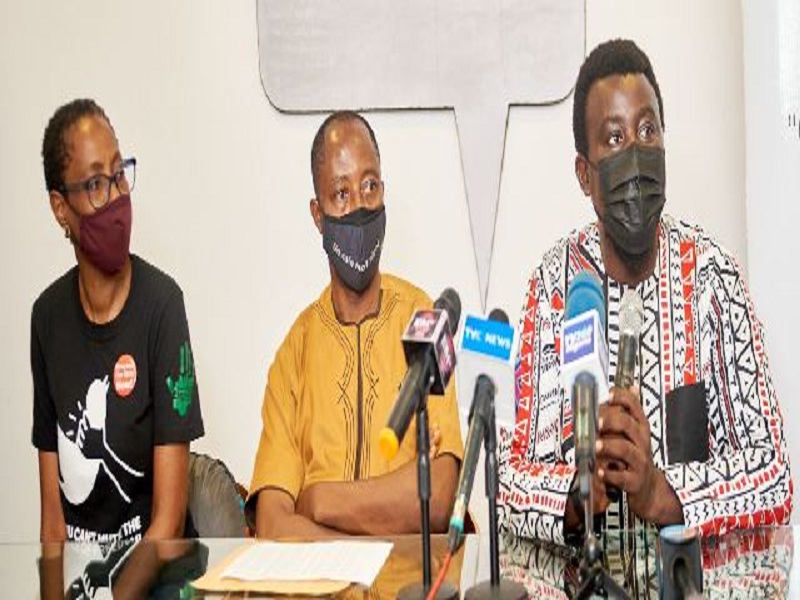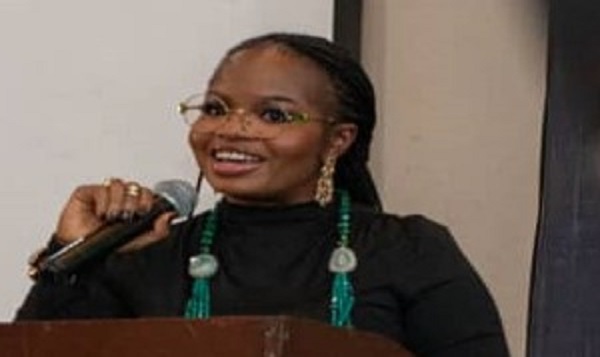News
Civil Right Groups Decry FG’s Continuous Ban on Twitter

Coalitions of human right groups have decried the continuous ban on Twitter, a Microblogging firm by the federal government.

Nigeria CommunicationsWeek reports that Nigeria’s Twitter ban entered 100 days on Sunday, September 12th, 2021.
Valery Njiaba, Communications Officer, Paradigm Initiative, in a statement released on Tuesday, said that this stringent and obnoxious position by the federal government has left the civil society, frontline actors and organizations advocating for digital rights and freedom of expression in disarray.
On Monday, September 13th, Paradigm Initiative (PIN), Enough is Enough (EiE) Nigeria, Media Rights Agenda (MRA), and Socio-Economic Rights and Accountability Project (SERAP) jointly organized a press conference to dissect the implications and the way forward on the Twitter ban in Nigeria at CIVIC Hive, Yaba, Lagos.
According to the statement, “On the panel to shed light on the trending and unlawful act were ‘Gbenga Sesan, PIN’s Executive Director, ‘Yemi Adamolekun, EiE Nigeria’s Executive Director, and Ayode Longe, MRA’s Program Director.
“They unanimously called on the Federal Government to refrain from actions that put Nigeria among the nations that constantly violate human rights and infringe on its citizens’ fundamental and socio-economic rights guaranteed by their constitution”.
‘Gbenga Sesan addressing members pointed a finger at the government stating the ban on Twitter in Nigeria is a misplaced priority, amidst all the critical issues the country is facing, and Twitter is not one of them.
He looked at the economic impact of the ban saying the ban has impacted revenue projections of many businesses, and that according to netsblock.com Nigeria has lost N148bn In 100 Days.
Also, ‘Yemi Adamolekun stretched on the fact that “for the government to constantly shy from pertinent issues such as security, unemployment, and blame a platform for allowing people to express their dissatisfaction is pure laziness and shows they are not ready to solve these issues” also indicating the Twitter ban is a disservice to both the government and its citizens.
In his opening statement, Ayode Longe MRA’s Program Director gave a rundown of the coalition’s activities against the Twitter ban, Partners’ Actions, and Activities in Response to Suspension of Twitter.
These are just a few of the actions taken in defense of our right to freedom of expression and access to information as well as the rights of all other Nigerians.
News
Stakeholders Demand Stronger Governance and Infrastructure to Drive Tech Adoption @ Lagos AI Summit

As AI adoption accelerates across Nigeria, leaders at the “AI in Action Now” conference 2026 have called for a balance between rapid innovation and strict regulatory governance. The event, held at the Lagos Oriental Hotel, highlighted both the doggedness of Nigerian builders and the risks of unregulated data usage.

Dotun Adeoye, Co-Founder of AI Nigeria, raised alarms over “Shadow AI”, a trend where employees upload sensitive official documents to public AI platforms. He praised the Nigerian Data Protection Commission (NDPC) for its recent aggressive stance, including multi-million-dollar fines against major banks and social media brands.
“Innovation without governance is dangerous. The regulator now has the job of educating players. We are working in partnership with them to ensure players don’t just get fined, but actually understand how to protect data locally rather than storing it abroad, ” Adeoye noted.
Addressing issues of lack of infrastructure to carry AI adoption, Conference Convener Debola Ibiyode admitted that while Nigeria lacks the traditional foundation for AI adoption, the tech community cannot afford to wait.

“The simple answer is we don’t have the infrastructure, but Nigeria has never really had infrastructure to drive anything, and we still thrive, ” Iboyode said, encouraging students and builders to look beyond current limitations. “Once we start to build based on what we have now, it will encourage those who need to provide the infrastructure to do their part. The world will not wait for us,” she insisted.
To bridge this gap, she highlighted the AI Foundry Africa, an incubator designed to mentor ideas into market-ready products.
Meanwhile, speaking to journalists on the sidelines, Biodun Ogunleye, the Lagos State Commissioner of Energy and Mineral Resources, echoed the sentiment that the government’s role is to facilitate the right environment through partnership. He emphasized that data generated from interactions with the government must have long-term value.
“We must ensure that in all facets from production to interaction with government, the tools required to ensure data has value are appreciated,” Ogunleye stated.
He concluded that through private-sector collaboration, the government can focus on its primary functions while leveraging AI to ensure the nation aspires for the future.
News
35 Million Nigerians Face Acute Hunger in 2026, UN Warns

About 35 million Nigerians face acute hunger risks in 2026, including three million children battling severe malnutrition, the United Nations has warned, attributing the crisis to collapsing global aid budgets and escalating violence in the northeast.

UN Resident and Humanitarian Coordinator Mohamed Malick Fall disclosed this on Thursday during the launch of the 2026 humanitarian plan in Abuja, noting that the traditional foreign-led aid model proves unsustainable amid Nigeria’s escalating needs.
He highlighted dire conditions in Borno, Adamawa and Yobe states, where over 4,000 people perished in the first eight months of 2025 from surging suicide bombings and attacks—equalling the entire previous year’s toll.
The UN now targets $516 million to deliver lifesaving aid to 2.5 million people this year, a sharp drop from 3.6 million in 2025 and half of prior levels, forcing prioritisation of only the most critical interventions.
Fall stressed, “These are not statistics. These numbers represent lives, futures and Nigerians,” as shortfalls last year compelled the World Food Programme to halt support for over 300,000 children after resources dried up in December.
Yet, Fall acknowledged Nigeria’s increasing national ownership, including local funding for lean-season food assistance and proactive flood early-warning systems, signalling a shift toward self-reliant crisis response.
News
NITDA Commits to Digital Inclusion for Persons with Disabilities

The National Information Technology Development Agency (NITDA) has reaffirmed its commitment to inclusive digital development following the completion of a two-day digital literacy training for persons with disabilities (PWDs) in Abuja.

The programme, organised under NITDA’s Digital Literacy for All (DL4ALL) initiative, the programme trained 50 participants in practical digital skills to enhance their participation in Nigeria’s expanding digital economy.
In his remarks, the Director-General, Kashifu Inuwa CCIE, stated that the programme reflects the agency’s determination to ensure accessibility remains a core component of national digital transformation efforts.
He explained that genuine digital advancement cannot be realised without the inclusion of persons with disabilities, adding that millions of Nigerians remain constrained by limited access to accessible and inclusive digital platforms.
“In many cases, the problem is not the absence of digital tools but the lack of accessibility. Platforms that do not support assistive technologies, non-captioned content and inaccessible websites effectively shut people out and limit opportunities,” he added.
Inuwa further explained that the initiative aligns with President Bola Ahmed Tinubu’s Renewed Hope Agenda, which prioritises inclusivity as a driver of national development. He stressed that persons with disabilities should be recognised as active contributors to economic growth rather than dependants.
“When equipped with the right skills and technologies, persons with disabilities become innovators, entrepreneurs and professionals who contribute meaningfully across sectors,” he added.
He acknowledged the role of Inclusive Friends Association (IFA) and SIMBED in delivering the training, describing the collaboration as a model of how government and civil society partnerships can advance inclusive development.
Highlighting NITDA’s broader digital literacy drive, the Director-General said the DL4ALL programme is a key component of the agency’s Strategic Roadmap and Action Plan, which targets 70 per cent digital literacy by 2027 and 95 per cent by 2030.
He explained that the initiative operates through three main tracks: an informal sector programme that has trained more than 480,000 Nigerians across 30 states and the Federal Capital Territory since September 2024; an education sector programme focused on embedding digital skills into learning institutions; and a workforce readiness programme designed to strengthen digital competence in both public and private sectors.
“This programme is not merely a pilot. It is proof that inclusive and intentional training works, and that persons with disabilities can excel when given equal opportunities,” Inuwa stated.
Also speaking, the Managing Director and Chief Executive Officer of SIMBED, Mr Daniel Onunkwo, described the training as a significant step towards closing the digital inclusion gap for persons with disabilities.
Onunkwo added that the initiative sends a strong message about equity and national progress, adding that SIMBED remains committed to expanding digital empowerment for persons with disabilities.
Similarly, the Executive Director of Inclusive Friends Association, Grace Jerry, represented by Tracy Agbamu, commended NITDA for demonstrating intentional leadership in promoting inclusion under the Renewed Hope Agenda.
She urged participants to continue applying the skills acquired and to serve as digital inclusion advocates within their communities.
The training programme further strengthens NITDA’s vision of building a digitally inclusive Nigeria where access to digital opportunities is determined not by physical ability but by empowerment and innovation.

 E-Financial2 days ago
E-Financial2 days agoZenith Bank Gets Regulatory Approval for Full Takeover of Paramount Bank

 Telecom3 days ago
Telecom3 days agoMTN Nigeria Suffers 9,218 Fibre Cuts in 2025 as Vandalism, Theft Cripple Network

 E-Business2 days ago
E-Business2 days agoFirm Detected a Fivefold Surge in QR Code Phishing Attacks in the Second Half of 2025

 Telecom2 days ago
Telecom2 days agoNew Investment Fund Targets Acceleration of Emerging Technology in Nigeria

 News2 days ago
News2 days agoNITDA Commits to Digital Inclusion for Persons with Disabilities

 General News2 days ago
General News2 days agoPalmPay User Shares Experience on Fintech Apps to Trust in Nigeria

 News2 days ago
News2 days agoStakeholders Demand Stronger Governance and Infrastructure to Drive Tech Adoption @ Lagos AI Summit

 General News2 days ago
General News2 days agoNigerians Target Self-Improvement, Business Startups in 2026 Google Data
























